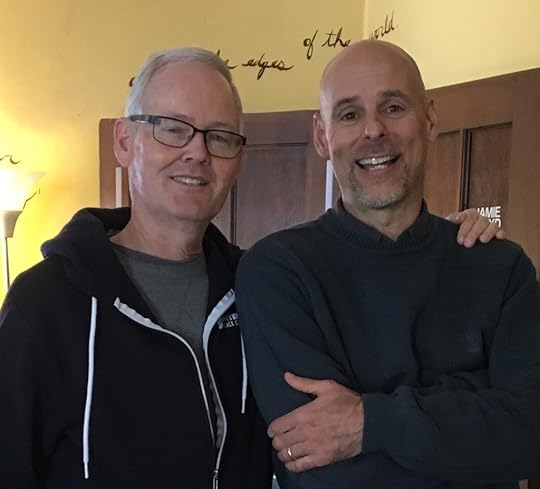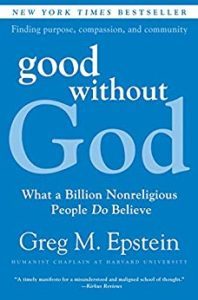Rick Mattson's Blog, page 14
November 11, 2018
Notepad Apologetics, Short Lesson #6: Secular Humanism (part 3), My Critique
In my prior post I offered an affirmation and two brief explanations (from a Christian perspective) of Humanism.
In this post I offer some observations that are more critical.
Again, the claim of Humanists is that we can be good without God . . . And in fact we’re doing just that. Just watch us . . .
So if I may offer four critiques of Humanism:
1. Quality counts. I realize this is a subjective call, but in my estimation nothing beats Christian community empowered by the Spirit and rooted in prayer — to love, serve, think clearly, heal physical and emotional maladies, and live a moral life.
Humanism, by definition, has only human resources to draw from. Admittedly, that’s a lot. But it fails to tap into the fuel of the Holy Spirit.
2. Existentialism sufficient? One of the tenets of Humanism is the need to choose the good. This is a principle borrowed from a philosophy called existentialism.
Existentialism says, in effect, the universe is meaningless, but we humans have the capacity to be meaning-makers. So we must choose to be good, choose to act. Not to choose is failure.
But of course that’s precisely the problem. Unredeemed human hearts have only so much capacity to choose the good and carry it out (also true of nominal Christians).
3. Naturalism a weak foundation. Humanism stands on the platform of naturalism (atheism). So while I might affirm the basic outlook of Humanist ideals to “do good,” any project based on naturalism will depend on whether naturalism is actually true.*
After four decades of being in this debate, I’m still convinced Christianity is the most comprehensive, coherent position available to us. Definitely not naturalism. I’ve commented on this elsewhere.**
4. Why not be bad? There’s a joke among atheists/Humanists who’ve left religion behind: “I didn’t suddenly become an axe murderer.”
Right. I think we know that. But the problem with naturalism is that egotism and self-interest — even at the expense of others — follows just as logically as Humanism. To offer an extreme example, Joseph Stalin fits with naturalism as well as Thomas Jefferson.
To Epstein’s credit, he acknowledges the varied possible endpoints of naturalism, and he wishes to choose the high road. But if I am a contrarian and simply choose the low road of “me first no matter what,” there’s little in naturalism to restrain me.
* * *
Face to face with Humanism: Recently I had a 90-minute conversation with well-known Humanist Bart Campolo, an ex-Christian preacher whose famous father, Tony Campolo, helped shape a generation of evangelicals. I’ll tell you what happened with Bart and me in my next post.
*Ironically, I think Humanism would work best if Christianity is true. See my prior post for an explanation of why, from a Christian perspective, Humanism seems to work fairly well.
**See My Faith is Like Skydiving, ch 16: “How to Talk with Modern Atheists.” And/or this series of blog posts called “Love Your Atheist Neighbor.”
The post Notepad Apologetics, Short Lesson #6: Secular Humanism (part 3), My Critique appeared first on Rick Mattson Outreach Ministry.
Notepad Apologetics, Short Lesson #6 (part 3): Secular Humanism, My Critique
In my prior post I offered an affirmation and two brief explanations (from a Christian perspective) of Humanism.
In this post I offer some observations that are more critical.
Again, the claim of Humanists is that we can be good without God . . . And in fact we’re doing just that. Just watch us . . .
So if I may offer four critiques of Humanism:
1. Quality counts. I realize this is a subjective call, but in my estimation nothing beats Christian community empowered by the Spirit and rooted in prayer — to love, serve, think clearly, heal physical and emotional maladies, and live a moral life.
Humanism, by definition, has only human resources to draw from. Admittedly, that’s a lot. But it fails to tap into the fuel of the Holy Spirit.
2. Existentialism sufficient? One of the tenets of Humanism is the need to choose the good. This is a principle borrowed from a philosophy called existentialism.
Existentialism says, in effect, the universe is meaningless, but we humans have the capacity to be meaning-makers. So we must choose to be good, choose to act. Not to choose is failure.
But of course that’s precisely the problem. Unredeemed human hearts have only so much capacity to choose the good and carry it out (also true of nominal Christians).
3. Naturalism a weak foundation. Humanism stands on the platform of naturalism (atheism). So while I might affirm the basic outlook of Humanist ideals to “to good,” any project based on naturalism will depend on whether naturalism is actually true.
After four decades of being in this debate, I’m still convinced Christianity is the most comprehensive, coherent position available to us. Definitely not naturalism. I’ve commented on this elsewhere.
4. Why not be bad? There’s a joke among atheists/Humanists who’ve left religion behind: “I didn’t suddenly become an axe murderer.”
Right. I think we know that. But the problem with naturalism is that egotism and self-interest — even at the expense of others — follows just a logically as Humanism. To offer an extreme example, Joseph Stalin fits with naturalism as well as Thomas Jefferson.
To Epstein’s credit, he acknowledges the varied possible endpoints of naturalism, and he wishes to choose the high road. But if I am a contrarian and simply choose the low road of “me first no matter what,” there’s little in naturalism to restrain me.
* * *
Face to face with Humanism: Recently I had a 90-minute conversation with well-known Humanist Bart Campolo, an ex-Christian preacher whose famous father, Tony Campolo, helped shape a generation of evangelicals. I’ll tell you what happened with Bart and me in my next post.
The post Notepad Apologetics, Short Lesson #6 (part 3): Secular Humanism, My Critique appeared first on Rick Mattson Outreach Ministry.
Notepad Apologetics, Short Lesson #6: Secular Humanism (part 4), My Meeting with Bart Campolo
This is the fourth installment in my series on Secular Humanism (or simply Humanism), inside the larger series of “Notepad Apologetics.”
My prior post offered four critiques of Humanism.
Theorizing about these matters is one thing but live interaction with a true Humanist is another.
I met well-known Humanist Bart Campolo recently at the University of Cincinnati, where he serves as the Humanist Chaplain.
Bart was an evangelical preacher for three decades in the style of his father, Tony. But Bart had doubts for many years that blossomed fully into unbelief, especially when he connected with Humanist Chaplain Greg Epstein at Harvard.
Before our face-to-face meeting, I read the book Bart and his father Tony co-authored, Why I Left, Why I Stayed, which tells how Bart’s faith suffered “the death of a thousand cuts” and “ten thousand unanswered prayers” over the course of his career.
Tony openly grieves the atheism of his son. Yet, the two love and respect each other even in their now Christian-nonChristian relationship.
At the University of Cincinnati “Edge House” ministry center, I sat with Bart and a few onlookers for a noon-hour dialogue. He was cordial toward me, and repeated his insistence from his book that he was not out to deconvert Christians or Muslims or anyone else.
We talked of common concerns such as providing community for Christian students (me) and secular students (him). There were many parallels in our respective ministries – from social justice to morality to upholding the dignity of each person we encounter.
Deep into the conversation Bart brought up the topic of marriage between a believer and unbeliever, especially if one spouse had abandoned the faith, and asked me how I tend to counsel such couples.
I said the believing spouse should remain faithful and loving toward their now-apostate partner, speaking up for the faith when appropriate but mainly leaving the question of eternal destination in God’s hands.
Bart pressed me on this response, pointing out that now the believing spouse is saying to his/her partner, implicitly if not verbally, “You are worthy of hell. That’s where your life without God is headed.” And how could a marriage maintain its integrity when such an insult is in play?
In my next post I’ll tell you how I responded.
The post Notepad Apologetics, Short Lesson #6: Secular Humanism (part 4), My Meeting with Bart Campolo appeared first on Rick Mattson Outreach Ministry.
Notepad Apologetics, Short Lesson #6 (part 4): Secular Humanism, My Meeting with Bart Campolo
This is the fourth installment in my series on Secular Humanism (or simply Humanism), inside the larger series of “Notepad Apologetics.”
My prior post offered four critiques of Humanism.
Theorizing about these matters is one thing but live interaction with a true Humanist is another.
I met well-known Humanist Bart Campolo recently at the University of Cincinnati, where he serves as the Humanist Chaplain.
Bart was an evangelical preacher for three decades in the style of his father, Tony. But Bart had doubts for many years that blossomed fully into unbelief, especially when he connected with Humanist Chaplain Greg Epstein at Harvard.
Before our face-to-face meeting, I read the book Bart and his father Tony co-authored, Why I Left, Why I Stayed, which tells how Bart’s faith suffered “the death of a thousand cuts” and “ten thousand unanswered prayers” over the course of his career.
Tony openly grieves the atheism of his son. Yet, the two love and respect each other even in their now Christian-nonChristian relationship.
At the University of Cincinnati “Edge House” ministry center, I sat with Bart and a few onlookers for a noon-hour dialogue. He was cordial toward me, and repeated his insistence from his book that he was not out to deconvert Christians or Muslims or anyone else.
We talked of common concerns such as providing community for Christian students (me) and secular students (him). There were many parallels in our respective ministries – from social justice to morality to upholding the dignity of each person we encounter.
Deep into the conversation Bart brought up the topic of marriage between a believer and unbeliever, especially if one spouse had abandoned the faith, and asked me how I tend to counsel such couples.
I said the believing spouse should remain faithful and loving toward their now-apostate partner, speaking up for the faith when appropriate but mainly leaving the question of eternal destination in God’s hands.
Bart pressed me on this response, pointing out that now the believing spouse is saying to his/her partner, implicitly if not verbally, “You are worthy of hell. That’s where your life without God is headed.” And how could a marriage maintain its integrity when such an insult is in play?
In my next post I’ll tell you how I responded.
The post Notepad Apologetics, Short Lesson #6 (part 4): Secular Humanism, My Meeting with Bart Campolo appeared first on Rick Mattson Outreach Ministry.
Notepad Apologetics, Short Lesson #6: Secular Humanism (part 2), My Responses
In my prior post, I asked how Christians should respond to the claim of Secular Humanism, embedded in the title of the popular book, Good Without God, by Harvard/MIT Humanist Chaplain Greg Epstein.
In the book Epstein names some famous figures who he claims were fellow Humanists, including Thomas Jefferson, Winston Churchill, Jean-Paul Sartre, and John Lennon.
What they all had in common was a commitment to the highest human ideals of compassion, dignity, and service to others – absent any support from God or religion.
Three of my responses (more to follow in the next post):
1. More power to them. I find myself in support of Humanism for its positive contributions to the common good of society and its rejection of the harsher forms of atheism seen in the last twenty years.
2. Chalk it up to common grace. This is God’s favor given to humankind in general. The Psalmist says that the Lord is “good to all. He has compassion on all he has made.”
And Jesus teaches that God causes the sun to rise on the evil and the good, and sends rain on the righteous and the unrighteous.
The upshot of common grace is that even in a fallen world God provides the resources for humanity to function at a certain level of proficiency. Hence the relative success of Humanists.
3. Image of God preserved. Though fallen, human beings are still made in God’s image and thus retain a vestige of God’s goodness in their lives and are capable of virtue in some measure.
* * *
What critique might be made of Humanism? I’ll share mine in the next post.
The post Notepad Apologetics, Short Lesson #6: Secular Humanism (part 2), My Responses appeared first on Rick Mattson Outreach Ministry.
Notepad Apologetics, Short Lesson #6 (part 2): Secular Humanism, My Responses
In my prior post, I asked how Christians should respond to the claim of Secular Humanism, embedded in the title of the popular book, Good Without God, by Harvard/MIT Humanist Chaplain Greg Epstein.
In the book Epstein names some famous figures who he claims were fellow Humanists, including Thomas Jefferson, Winston Churchill, Jean-Paul Sartre, and John Lennon.
What they all had in common was a commitment to the highest human ideals of compassion, dignity, and service to others – absent any support from God or religion.
Three of my responses (more to follow in the next post):
1. More power to them. I find myself in support of Humanism for its positive contributions to the common good of society and its rejection of the harsher forms of atheism seen in the last twenty years.
2. Chalk it up to common grace. This is God’s favor given to humankind in general. The Psalmist says that the Lord is “good to all. He has compassion on all he has made.”
And Jesus teaches that God causes the sun to rise on the evil and the good, and sends rain on the righteous and the unrighteous.
The upshot of common grace is that even in a fallen world God provides the resources for humanity to function at a certain level of proficiency. Hence the relative success of Humanists.
3. Image of God preserved. Though fallen, human beings are still made in God’s image and thus retain a vestige of God’s goodness in their lives and are capable of virtue in some measure.
* * *
What critique might be made of Humanism? I’ll share mine in the next post.
The post Notepad Apologetics, Short Lesson #6 (part 2): Secular Humanism, My Responses appeared first on Rick Mattson Outreach Ministry.
October 6, 2018
Notepad Apologetics, Short Lesson #5 (part 3): Slavery and the Bible
In my last post I presented the idea of God as a gradualist. He works on social reforms incrementally — at the speed of humanity rather than the speed of divinity. The incarnation is the ultimate example of God “walking at our pace.”
This post is about God’s work on the problem of slavery.
Main Point: The Bible shows forward progress on slavery and thus points ahead to an ideal of freedom and equality, but without realizing that ideal in its own time period.
The Bible takes as a starting point the cultures of the ancient world, where slaves were treated brutally.
The Bible then significantly upgrades the conditions for slaves in ancient Israel and the church, providing them with sabbath rest, seventh-year release (for some), restraints on harsh treatment, refuge for runaways, and judgment against traders. This puts the Bible out ahead of the cultures of its day.*
But slavery is still not eradicated. That is left to us. God is still working on the problem of slavery, and he’s called the church to be his primary instrument of reform.
Redemptive-movement: This gradual way of working on social problems is sometimes called a redemptive-movement because it takes the “redemptive” spirit of the biblical texts and projects it forward (the “movement”) into the work of the church.
So we are back to gradualism. God works on the problem of slavery incrementally, at the speed of the church, rather than simply snapping his fingers and eradicating a social ill by divine fiat.
* * *
Note: No doubt God does in fact work directly on the issue of slavery in ways we cannot know — at least in restraining (if not eliminating) evil. This may be happening in the sex-slave industry, for example.
Even so, his main instrument is still the church. The flawed, often slow-moving church.
The critical question is: Are we in the church cooperating with his work?
Suggested resources
Is God a Moral Monster? by Paul Copan
Slaves, Women, and Homosexuals by William Webb. *See pp 74-76.
Photo by Manuel Sardo on Unsplash
The post Notepad Apologetics, Short Lesson #5 (part 3): Slavery and the Bible appeared first on Rick Mattson Outreach Ministry.
October 3, 2018
Notepad Apologetics, Short Lesson #5 (part 2): God the Gradualist
In my prior post I mentioned that God is generally a gradualist, aside from a few big-ticket items such as performing instantaneous miracles.
What do I mean by “gradualist”?
Just this: God works on major human problems and institutions a little at a time. He doesn’t simply snap his fingers or wave his wand to make everything okay.
God could have banned slavery, polygamy, divorce, violence, misogyny, and a host of other issues, right away in the first five books of the Bible.
Instead, he accommodated human weakness by working patiently within human culture and institutions to effect change . . . gradually.
Theologian Paul Copan notes that God works incrementally throughout the Bible toward an ultimate ideal: the coming reign of Jesus Christ.
Thus, God is more likely to raise up Joseph in the land of Egypt, Daniel in Babylon, Mary in Nazareth, and Paul in Syria — all of them change agents — than to simply zap the world to make it better.
Why?
When university students ask this, I reply that it has something to do with enlisting human partnership and human agency in repairing a world that went bad because of human choices.
To over-simplify: If my child causes a mess, I don’t just clean it up. I involve the child in the process — partly as a developmental exercise for the child, but also as a statement of justice: people need to face the consequences of their actions, and also work to make reparation.
* * *
To summarize: God works on big human problems a little at a time, always progressing toward the ultimate goal (or ideal) of the Kingdom of God. That’s the idea of God being a gradualist.
In my next post: zeroing in on slavery and marriage in the Bible.
Photo by Matt Duncan on Unsplash
The post Notepad Apologetics, Short Lesson #5 (part 2): God the Gradualist appeared first on Rick Mattson Outreach Ministry.
October 2, 2018
Notepad Apologetics, Short Lesson #5 (part 1): What about Slavery and Polygamy?
Recently at the University of Michigan, a grad student in a Stump the Chump* session asked me why the Bible condones practices we no longer consider ethical, such as slavery and polygamy.
My answer to this and similar questions about aberrant practices in the Bible (divorce, rape, looting, concubinage, etc.) usually boils down to this:
God is not in the finger-snapping business.
That is, God accommodates human weakness, and works on human problems gradually. Yes, God is a gradualist.
But not always. Sometimes he parts the Red Sea or casts out a demon or rises from the dead. Immediately.
But for the most part, God works on problems at the speed of humanity, not the speed of divinity.
* * *
University students, however, tend to think of God as a perfect, omnipotent Force who could easily solve massive problems instantaneously, but for some reason . . . doesn’t.
Any Being with that kind of power who fails to use it is, essentially, unethical — and not worth following or believing in.
Case in point: Jesus confined his redemptive work to two or three years in the history of the planet, leaving countless people unhealed, unsaved, suffering, un-rescued, and in harm’s way.
A truly ethical and caring God would have sent his Son, somehow, to all human beings at all times and places. That’s the sort of thing that “God” — if he’s really God — can do.
Gradualism be damned . . . and so the criticism goes.
* * *
Next post: What it means to say that God is a gradualist.
* Stump the Chump is an event on campus where students can come and ask me any question they wish about Christianity. My job is to offer a thoughtful reply.
The post Notepad Apologetics, Short Lesson #5 (part 1): What about Slavery and Polygamy? appeared first on Rick Mattson Outreach Ministry.
Notepad Apologetics, Short Lesson #5: What about Slavery and Polygamy?
Recently at the University of Michigan, a grad student in a Stump the Chump* session asked me why the Bible condones practices we no longer consider ethical. She went on to mentioned slavery and polygamy.
My answer to this and similar questions about aberrant practices in the Bible (divorce, rape, looting, concubinage, etc.) usually boils down to this:
God is not in the finger-snapping business.
That is, God accommodates human weakness, and works on human problems gradually. That’s right, God is a gradualist.
But not always. Sometimes he parts the Red Sea or casts out a demon or rises from the dead. Immediately.
But for the most part, God works on problems at the speed of humanity, not the speed of divinity.
* * *
University students, however, tend to think of God as a perfect, omnipotent Force who could easily solve massive problems instantaneously, but for some reason . . . doesn’t.
Any Being with that kind of power who fails to use it is, essentially, unethical — and not worth following or believing in.
Case in point: Jesus confined his redemptive work to two or three years in the history of the planet, leaving countless people unhealed, unsaved, suffering, un-rescued, and in harm’s way.
A truly ethical and caring God would have sent his Son, somehow, to all human beings at all times and places. That’s the sort of thing that “God” — if he’s really God — can do.
Gradualism be damned . . . and so the criticism goes.
* * *
Next post: What it means to say that God is a gradualist.
* Stump the Chump is an event on campus where students can come and ask me any question they wish about Christianity. My job is to offer a thoughtful reply.
The post Notepad Apologetics, Short Lesson #5: What about Slavery and Polygamy? appeared first on Rick Mattson Outreach Ministry.









